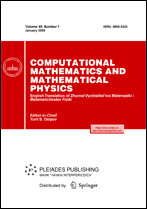|
This article is cited in 2 scientific papers (total in 2 papers)
Partial Differential Equations
On one inverse problem for the Kolmogorov–Fokker–Planck equation
N. V. Trusovab
a Federal Research Center "Computer Science and Control" of Russian Academy of Sciences, 119333, Moscow, Russia
b Moscow Center for Fundamental and Applied Mathematics, 119991, Moscow, Russia
Abstract:
A mathematical description of the household economic behavior with the help of the Kolmogorov–Fokker–Planck equation is studied. This equation describes the dynamics of the household distribution density with respect to two characteristics: financial state and income. The agreement between statistical data and the solution of the Kolmogorov–Fokker–Planck equation is examined using statistical Rosstat data on the economic state of households in Russia. The problem is formalized as minimizing the deviation of the solution to the Kolmogorov–Fokker–Planck equation from the statistical data by managing household consumption. The extremal problem is solved numerically, and numerical results are presented.
Key words:
Kolmogorov–Fokker–Planck equation, extremal problem, numerical solution, Ramsey-type model, consumer loan.
Received: 15.09.2022
Revised: 15.09.2022
Accepted: 17.11.2022
Citation:
N. V. Trusov, “On one inverse problem for the Kolmogorov–Fokker–Planck equation”, Zh. Vychisl. Mat. Mat. Fiz., 63:3 (2023), 408–423; Comput. Math. Math. Phys., 63:3 (2023), 386–400
Linking options:
https://www.mathnet.ru/eng/zvmmf11524 https://www.mathnet.ru/eng/zvmmf/v63/i3/p408
|


| Statistics & downloads: |
| Abstract page: | 90 |
|





 Contact us:
Contact us: Terms of Use
Terms of Use
 Registration to the website
Registration to the website Logotypes
Logotypes








 Citation in format
Citation in format 
